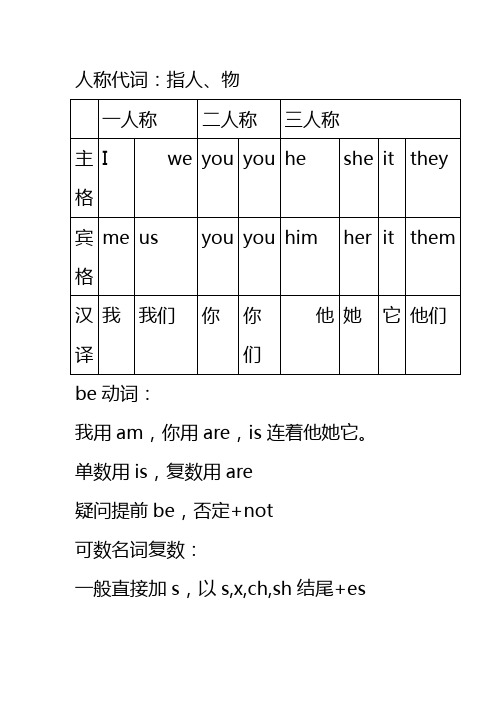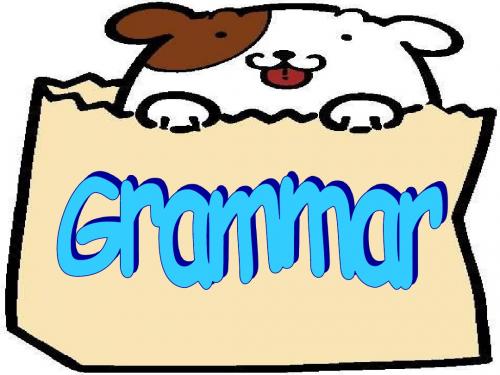英语语法Grammar
英语语法汇总Grammar

英语语法汇总Grammar营口高中韩祥宇目录contents一.时态二.冠词三.代词四.介词和介词短语五.形容词和副词六情态动词七.非谓语动词八.简单句和并列句九.倒装十.情景交际十一.定语从句十二.名词性从句十三.状语从句§一时态一进行体①现在进行时 1.look! what is he doing 表示说话时正在发生的动作2.目前这段时间的持续(不强调起止) eg:⑴He is writing a novel these day⑵I’m just helping until the new secretary(秘书)comes3.终止性动词(非延续性动词)的进行体表将来,有计划性。
4.“越来越”表渐进性 eg:It’s getting cooler and cooler5.eg:always/forever表示说话人的赞扬或抱怨/constantly(经常的)②将来进行时 1.形式will/shall be doing2.表示未来将于某一段某一点3.表推测(客观存在)无计划性表可能 eg:I shall be meeting Alice.③完成进行时 1.形式have/has been doing2.强调持续性,强调中间无间断3.延续性 eg:I have been writing a report which will finished tomorrow.4.非延续性动词用于完成进行时表反复性 eg:Since summer this year he have been going to the night school(自从去年夏天,他一直去夜校)二完成体①现在完成时 1.形式have/has done2.有起点(过去)有终点(现在)不强调过去什么时候发生,只强调现在什么时候完成。
3.动作发生在过去持续到现在4.动作没持续到现在但影响持续到现在 eg:I got caught in the rain just now any coat has been damaged5.曾经有过的经历6.说话所处的时间段内反复发生的动作 eg:Tom’s car has been broken into five’s this month.7.句型:It is(现在时)the first time(that)I have seen(现在完成时)the film.seen(现在完成时) ever since.eg2: When he came to,he wondered how long he had lain(躺)on the ground.②将来完成时 1.形式will/shall have done2.by+将来时间状语 eg:By the end of this year,I will have finished this job.3.主将从现eg:{By(将来时间点) the time I arrived(现在时)}(时间状语从句),Tom will have left.三一般体①一般现在时 1.表示性质,状态,属性,特征2.表示频度,经常性※反例:I didn’t ask for the name list how has it landed on my dask?3.客观事实(书评、影评、真理、文学评论)4.固定时间发生的事用现在时替代将来时。
英语语法Grammar

1 (see 、hear 、notice 、find 、feel 、listen to 、look at (感官动词)+do eg:I like watching monkeys jump2 (比较级and 比较级)表示越来越怎么样3 a piece of cake =easy 小菜一碟(容易)4 agree with sb 赞成某人5 all kinds of 各种各样a kind of 一样6 all over the world = the whole world 整个世界7 along with同……一道,伴随……eg : the students planted trees along with their teachers 学生同老师们一起种树8 As soon as 一怎么样就怎么样9 as you can see 你是知道的10 ask for ……求助向…要…(直接接想要的东西)eg : ask you for my book11 ask sb for sth 向某人什么12 ask sb to do sth 询问某人某事ask sb not to do 叫某人不要做某事13 at the age of 在……岁时eg:I am sixteen I am at the age of sixteen14 at the beginning of …………的起初;……的开始15 at the end of +地点/+时间最后;尽头;末尾eg : At the end of the day16 at this time of year 在每年的这个时候17 be /feel confident of sth /that clause +从句感觉/对什么有信心,自信eg : I am / feel confident of my spoken English I feel that I can pass the test18 be + doing 表:1 现在进行时2 将来时19 be able to (+ v 原) = can (+ v 原)能够……eg : She is able to sing She can sing20 be able to do sth 能够干什么eg :she is able to sing21 be afraid to do (of sth 恐惧,害怕……eg : I'm afraed to go out at night I'm afraid of dog22 be allowed to do 被允许做什么eg: I'm allowed to watch TV 我被允许看电视I should be allowed to watch TV 我应该被允许看电视23 be angry with sb 生某人的气eg : Don't be angry with me24 be angry with(at) sb for doing sth 为什么而生某人的气25 be as…原级…as 和什么一样eg : She is as tall as me 她和我一样高26 be ashamed to 不好意思…27 be away from 远离28 be away from 从……离开29 be bad for 对什么有害eg : Reading books in the sun is bad for your eyes 在太阳下看书对你的眼睛不好30 be born 出生于情感型使动词表示客观事物使人产生情感上的变化,可以分为下列概念:(1)惊讶(surprise);(2)高兴(delight);(3)恼怒(irritation);(4)烦扰(trouble);(5)兴趣(interest);(6)激动(excitement);(7)迷惑(bewilderment);(8)坚信(conviction);(9)恐吓(fright);(10)厌倦(tiredness)和(ll)愤怒(anger)。
Grammar英语语法

人称代词:指人、物be动词:我用am,你用are,is连着他她它。
单数用is,复数用are疑问提前be,否定+not可数名词复数:一般直接加s,以s,x,ch,sh结尾+eso结尾,有生命+es,无生命+s辅音+y结尾,y变i+esf,fe结尾,f,fe变v+esf,fe结尾,直接加s:giraffe,roof,handkerchief,scarf,golf可数名词有单复数,单数用a/an修饰,不可数名词无复数,常与a+量词+of+u.n. 两者都可用some修饰指示代词:this(这个),that(那个),these (这些),those(那些)所有格:表人:sb+’s表物:of(前后倒置)there be:有地点介词:里面in,上面on,over,under 上下方;between…and两者间,among用于3者间,紧挨next to,附近near,before 后面,in front of在外部前方,in the front of空间内部前方来自from,朝前to,里面穿过是through,表面穿过across,到里面into,到上面onto 一般现在时:表示经常反复、现在状态、客观真理助动词:do,does否定分别don’t,doesn’t 动词单三:一般+s,以s,x,ch,sh,o结尾,词尾+es,辅音+y结尾,y变i+es,have单三是has 一般疑问句把be、情态动词、助动词提前,谓语动词还原特殊疑问句=特殊疑问词+一般疑问句how many提问可数名词复数how much提问不可数名词年月季节前用in,日期前面可不行,具体几号要用on,上午下午又是in,具体某天上下午,要用on来不用inat用法真不少,正午午夜到黎明频度副词:always(100%),usually(90%),often(80%),sometimes(40%),seldom(30%) never(0%)现在进行时:表现在正在进行的动作结构:be+doing现在分词变化规则:一般直接+ing不发音e结尾,去e+ing重读闭音节结尾,双写词尾辅音字母+ing ie结尾,ie变y+ing形容词:系动词后,名词前;译为:…的方式副词:用在动词后,译为:…地形容词变副词规则:一般直接+ly,个别e结尾去e+ly,y结尾,y变i+ly情态动词:can,should,shall,would,could+v原;否定+not,疑问直接提前have to,would like to,+v原;否定前+don’t 疑问前+do一般过去时:表过去发生的事动词过去式变化规则:一般直接+ed,e结尾+d,辅音字母+y结尾,y变i+ed重读闭音节,双写辅音字母+ed过去时中,助动词用did,be的过去式为was(am,is),were(are)其他结构和现在时相同祈使句:表命令、警告、指示、建议肯定:v原+其他否定:don’t+v原+其他and表并列,多个成分用and连接,在最后两个成分之间,其余用逗号隔开or表选择,用法与and相同but表转折,连接相反意义的词some用于肯定句中,接可数名词复数或不可数名词any用于否定句和疑问句中,用法和some一样表委婉语气时,some在疑问句中不变any 形容词、副词的比较级和最高级变化规则:一般+er/est,e结尾,+r/st重读闭音节结尾,双写辅音字母+er/est 辅音字母+y结尾,y变i+er/est多音节词在前面+more/most一般将来时:表将要发生,或对未来打算三种表达方式:will/shall+v原be going to+v原be doing表将来过去进行时:表过去某一时间正在进行的动作构成:was/were+doing现在完成时:表发生在过去已经完成的动作对现在造成的影响或后果结构:have/has+done一般动词过去分词与过去式变化相同一般疑问句把have/has提前其他不变,否定在have/has后+nothave been to曾经去过某地(已回)have gone to曾经去过某地(未回)already(已经)用在have/has和过去分词之间,用在句末表强调,常用于肯定句中yet用法和汉译与already相同,常用于否定或疑问句中since+时间点,译为自从…以来for+段时间,现在完成进行时:表开始于过去,现在仍进行或刚刚结束的动作现在完成进行时构成:have/has been doing 时间状语从句:1.when引导:表时间段或时间点,译为当…时候用法:主从同现/过,或主将从现2.while引导:表主、从动作同时进行用法:主从同现/过3.as soon as引导:译为一…就…4.not…until…引导:译为直到…才…条件状语从句:1.if引导:译为如果用法:主将从现2.unless引导:译为如果不/除非用法和if相同unless引导否定从句,与if…not不可互换,否则意思相反结果状语从句:so…that…引导:译为如此…以致于…原因状语从句:because引导:译为因为because和so不能连用because引导原因状语从句,从句一般在主句之后让步状语从句:although/though引导:译为虽然although/though不能和but/however连用直接引语:直接用别人原话,用引号标出间接引语:用自己的话转述别人的话,不用引号直接引语变间接引语要把现在时变为过去时,一人称变三人称,三人称一般不变附加疑问句:在陈述句之后,表对陈述内容提出质疑或通过反问以确定陈述句的一种疑问句构成:前肯后否,前否后肯陈述部分是I’m,附加部分用aren’t I答语用yes,肯定陈述部分;no否定陈述部分陈述句带有否定词,附加用肯定不定代词(表人)在正式语体中用he,非正式语体中用they不定代词(表物)用it。
英语语法Grammar

先行词
时间状语 关系副词
定语从句
The time when I first met Nelson Mandela was a
very difficult period of my life.
第一次见到纳尔逊· 曼德拉的时候是在
我一生中非常艰难的时期。
先行词 关系副词
地点状语
The school where I studied only two years
我祖父从前住的屋子离这儿不远。
The room is not far from here.
My grandfather once lived there.
The room where my grandfather once lived
关系副词 先行词
is not far from here.
定语从句
代词、分数词、数词等。 e.g. 1. In the dark street, there wasn’t a single D person _____she could turn for help.
A. that B. who C. from whom D. to whom turn to sb.for help 向某人寻求帮助
1.You saw the museum the other day. 2.We saw an exhibition in the museum the other day.
where= in which 3.He has left for Beijing,__________a meeting
will be held. which 4.He has left for Beijing,_________is the capital of China.
初中英语语法 English Grammar

初中英语语法English Grammar目录构词法(word-formation)名词(Nouns)冠词(Articles)代词(Pronouns)数词(Numerals)形容词(Adjectives)副词(Adverbs)介词(Prepositions)动词(Verbs)动词的时态(Tenses)动词的语态(Voices)限定动词与非限定动词(Finite and Non-finite Verbs)简单句(The simple sentences)It的用法(The use of “it”)并列句(The compound sentences)主从复合句(The complex sentences)构词法(word-formation)构词法(word-formation)——分为转换、派生、合成转换:常用于动词和名词之间的转换1)不改变读音、重度音节,只转换单词词性e.g.2)有些双音节词,作名词时,第一个音节重度;作动词时,第二个音节重度e.g. 名词动词’increase /’inkri:s/ 增加in’crease /in’kri:s/增加3)有些词可以用读音变化改变词性e.g. excuse /iks’kju:s/(名)歉意;道歉;借口excuse /iks’kju:z/(动)原谅4)有些形容词可以转化为动词e.g. He slowed down at the crossroad./ Please warm up the cold meat.派生前缀:加前缀一般不改变词类,而只是改变原词的词义构成反义词的前缀dis- disagree disappear dislikeim- impolite impossibleun- unable uncertain unhappy一些表示特定意思的前缀down 往下downloadkilo 千kilometreman 人,由人man-mademis 错误地mistake misunderstandre 重新,再次rebuild retell可以改变词性的前缀加在名词前构成形容词或副词asleep aboard asideen- 加在名词或形容词前构成动词encourage enable enrich后缀:加后缀一般改变词性名词后缀-an African American -er dancer driver reporter -ing feeling reading -ion action decision-ment development government -ness happiness sadness-or actor visitor -tion invention pronunciation-ure failure pleasure②形容词后缀-an American African -en golden wooden-ese Chinese Japanese -ful beautiful hopeful useful-ive active expensive -less careless endless useless-ly friendly -ous nervous dangerous-y dirty rainy③副词后缀-ly carefully happily clearly④数词后缀-teen thirteen -ty twenty -th fifth合成合成名词词加名词basketball形容词加名词blackboard动词-ing形式+另一词dining-room合成形容词形容词+动词-ing形式hard-working形容词+过去分词kind-hearted名词+过去分词man-made名词+动词-ing形式man-eating peace-loving合成动词词+动词water-ski副词+动词overeat overcome③ 形容词/副词+动词white-wash合成副词、代词合成副词upstairs beforehand合成代词myself everything其他构词法1)缩短法telephone—phone2)前后各截部分refrigerator—fridge3)缩写法名词(Nouns)一、名词的数:名词复数的构成规则规则复数变化多数在词尾加-s以s,x,ch,sh结尾的名词加-es e.g. match—matches以辅音字母加y结尾的名词,改y为i,再加-es e.g. story—stories以f,fe结尾的名词,一般把f,fe改为v,再加-es e.g. leaf—leaves但也有只加-s e.g. roof—roofs④以o结尾的名词,多数加-es e.g. hero—heroes但也有只加-s e.g. piano—pianos注:以o 结尾的名词,我们可按下面一条规律来记住它们的复数形式:指人和农作物的加-es、其他的加-s.(或者是有生命的加-es,无生命的加-s)不规则变化①名词单复数同形 e.g. sheep, deer, fish②单词拼写中变化元音字母 e.g. man—men tooth—teeth③有些是用-en做词尾构成复数形式 e.g. child—children ox—oxen④表示某国人的单词,单复数形式分为三种:A.单复数相同 a Chinese—five ChineseB.词尾加-s an American—seven AmericansC.变-man为-men an Englishman—ten Englishmen复合名词的复数形式1.将复合名词中的主题名词变为复数形式 e.g. new-comer—new-comers2.没有主题名词的,则在词尾加-s e.g. grown-up—grown-ups3.以man或woman开头的复合词,名词都要变为复数形式 e.g. man-doctor—men-doctors4.其他合成的词,只把最后一个词变为复数eg.boy friend—boy friends5.由两部分组成的物体名词和其他一些名词常用复数形式 e.g. trousers,clothes,scissors6.专有名词一般为不可数名词,但是表示某姓一家或夫妇和同名同姓若干时,用复数e.g. The Browns have gone to the cinema.7.在做定语的合成词中,名词要用单数形式e.g. an eighty-three-year-old grandpa8.以-s结尾的专有名词有两种情况A.表示国家、报纸等名词看做单数 e.g. the United StatesB. 表示群岛、山脉、瀑布、奥运会等专有名词看做复数,谓语也用复数形式e.g. The Alps are in Europe.名词复数词尾加-s或-es的读音规则如下表二、名词的种类:普通名词——个体名词,集体名词(可数)物质名词,抽象名词(不可数)专有名词普通名词是某一类人、某一类事物、某种物质或抽象概念的名词个体名词:表示单个的人或物e.g. tree树doctor医生cup杯子apple苹果表示一群人或一些事物的总称e.g. crowd人群army军队class班级family家庭group小组,团队police警方team队public公众物质名词:表示无法分为个体的物质e.g. tea茶paper纸snow雪cloth布wood木头sugar糖meat肉sand沙ink墨水coffee咖啡抽象名词:表示动作、状态、品质、感情等方面的抽象概念e.g. happiness幸福work工作music音乐experience经历pride骄傲failure失败protection保护专有名词3)可数名词和不可数名词①可数名词:其所表示的事物可以用数来计算,前面可用不定冠词a,an和数词,有复数形式②不可数名词:其所表示的事物不可以用数来计算,前面不能用不定冠词a,an和数词,没有复数形式。
英语语法(Grammar)

英语语法(Grammar)一、一般疑问句(The General Question Sentence)1、句子中有am ,is ,are的,把am ,is ,are提前,句号(period /΄piəriəd/)变成问号(question mark)。
例:This is a boy. →Is this a boy?2、句子中有will ,can的,把will, can提前,句号(period /΄piəriəd/)变成问号(question mark)。
例:He can play ball. →Can he play ball?3、变一般疑问句时,把I we变成you,把am变成are 。
例:I am a boy. →Are you a boy?4、当句子中没有am ,is ,are ,will ,can时,需do , does帮忙⑴当句子人称是I , we, you , they等第一、第二人称或为复数名词(Birds)时,句子前加Do,句号变问号。
例:I know that man. →Do you know that man?⑵当句子人称是she, he, it等第三人称或为单数名词(a chair)时,句子前加Does,动词变成原形(has →have),句号变问号。
例:Lucy runs fast. →Does Lucy run fast?He has apen. →Does he have a pen?二、特殊疑问句(Special Interrogative Sentence)1、特殊疑问词:What(什么),Who(谁)What对thing提问(thing指职业、不明白的事或物), Who对person提问(person指人)。
结构:特殊疑问词+一般疑问句+?例:He is a doctor.用What代替a doctor, is提前到he前→What is he?This is a chair. →What is this?That woman is my mother. →Who is that woman?2、划线部分是地点(place):→用Where提问。
初中英语语法【grammar】

Grammar:6A-8BA:1.average (adj.):(found by making an average) 平均的average (n.) 平均数2.alive (adj.) (having life; not dead) 活着,在世living (adj.) 活的[比较]alive与living两者都有"活着的"意思.通常情况下alive作表语(be alive),而living + n.3.amount (n.) (a quantity) 数量,数额an amount of一定数量的a large amount of +不可数名词大量的a large/huge amount of+[u]n. 约等于mucha large/great number of +可数名词大量的约等于many4.agree (v.) 同意agree with somebody 同意某人的观点agree to do something 同意做某事agree on 一致同意[反义词] disagree 不同意5.adult (v.) (a fully-grown person) 成年人[近义]grown-up (n.) 大人,成人[拓展]adult (adj.) (fully grown or developed) 成年的,发育成熟的6.abroad (adv.) (in or to another country) 在国外,到国外go abroad 去国外go aboard 上车,上船7.attraction (n.) (s.t, that people like and feel interested in) 有吸引力的事或物可数名词attract (v.) 吸引attractive (adj.) 有吸引力的8.agricultural (adj.) (connected with farming) 农业的agriculture (n.) 农业9.attention (n.) (notice, thought or interest) 注意力draw/attract one's attention 吸引,引起某人的注意Attention, please! 请注意!pay attention to something = listen carefully注意......10.alone (adv.) (without anyone else) 独自alone (adj.) 独自一人的lonely (adj.)孤独的;寂寞的注意:形容词alone只能在be动词后作表语,而lonely既可作表语又可作定语修饰名词.11.accept (v.) (to take or receive something) 接受,收受acceptable (adj.)可接受的12.air conditioner (n.) 空调air conditioned (adj.) 有空调的13.alarm (n.) 警报器fire alarm 火警警报器14.author (n.) 作者[近义]writer (n.) 作家,作者15.a bit (to a small degree; somewhat) 有点.一点可修饰比较级,形容词,动词等等. = a little16.at once 立刻,马上[注意]表示"立刻,马上"的词或词组还有:immediately, right now, in no time,without delay.17.as well as = and … as well 也,还E.g. Mr Hu (as well as his student) is preparing for the festival.插入语就近原则The students as well as their teacher are preparing for the festival.18.asleep (adj.) (只能做表语)睡着的be asleep =fall asleep = go to sleep feel sleepy 昏睡的go to bed 上床睡觉(发生在sleep前)19.ambition (n.) 追求目标的,雄心,理想,志向ambitious (adj.) 有雄心的,野心勃勃的one’s ambition is to be / to do20.architect (n.) 建筑师architecture (n.) 建筑(不可数)21.all not … at all (强调否定)根本不22.achieve (v.) 实现,得到= getachievement (n.) 成就,功绩23.assist (v.) 帮助,协助,援助=helpassistant (n.) 助手24.attend (v.) 出席,参加(会议) =go to25.afraid (adj.) 害怕be afraid of something / doing something=be frightened of =be hurt26.aboard (adv.) 上船(或飞机,火车等)hurry aboard 匆忙上船= go aboard = go aboard in a hurry [注意] aboard与abroad 拼写相近,但发音,意思不同。
英语语法知识大全grammar

一. Tense (1. 时间状语; 2. 动词)1.一般现在时:1) 和时间无关;The sun rise s in the east and set s in the west.2) 在时间和条件状语中,用一般现在时代替将来时。
“主将从现”I’ll ring you as soon as/if he come s back.2.现在进行时:1) 表示厌恶、感激等强烈的感情。
She is always cooking some delicious food for us.He is always finding fault with his employees.3.一般过去时1) 和表示过去的时间状语连用, 如: yesterday, last week, in 1993, at that time, before---, a few days ago, when…等He smok ed forty cigarettes a day at that time.2) used to do, be used to doing, be used to do sthHe used to work fourteen hours a day.I am used to getting up early in the morning.The pen is used to draw the picture.4.现在完成时(Present Perfect )现在完成时的时间状语1)不确定的过去时间状语:(already, yet), before, recently, lately2)频率时间状语:often, sometimes, never, ever, once, twice, three times3)包括现在时间在内时间状语:now, just, today, this morning(week, month),until(up to) now, so far, in the past(last) two days(weeks, months),all day, for three years, since 19905.过去完成时(Past Perfect)1) 过去的过去They fulfill ed the plan earlier than they had expected.2) 过去完成时常和“by the end (time) of + 过去时间”连用3) hardly/scarcely ... when... 和no sooner ....than常用过去完成时=as soon asI had hardly reached the school when the bell rang.No sooner had I reached the school than the bell rang.6. 将来完成时将来完成时常和“by the end(time) of + 将来时间”连用。
- 1、下载文档前请自行甄别文档内容的完整性,平台不提供额外的编辑、内容补充、找答案等附加服务。
- 2、"仅部分预览"的文档,不可在线预览部分如存在完整性等问题,可反馈申请退款(可完整预览的文档不适用该条件!)。
- 3、如文档侵犯您的权益,请联系客服反馈,我们会尽快为您处理(人工客服工作时间:9:00-18:30)。
现在present ①be:am/is/are ②have (possess, have/has own): ③do (notional verb):do/does ④modal verb: can/may/must/ ought to/need/ dare + do
将来future ①be: will be ②have (possess, own):will have ③do (notional verb): will do ④modal verb: shall/will +do
– S-subject主语,V-verb动词,P-predicative表语,O-object宾语, A-adverbial状语, C-complement补语 – 之所以未用P-predicate谓语代替V-verb动词,一方面是避免谓语P 与表语P混淆,另一方面SVP不能变成SPP
• 并列句是基本句型的组合。并列连词用来连接地位并列的内容作 为句子的同一成分(并列成分)或连接两个及以上独立的句子, 各个句子保持原有基本句型组合(并列句)。 • 复合句是基本句型的组合、变化。关系代词、关系副词、从属连 词置于一个独立句子前,将其降格为一个成分,用于作主语叫做 主语从句,作宾语叫宾语从句,做表语叫表语从句,做同位语叫 同位语从句,做定语叫定语从句,做状语叫状语从句。 (复 合句。非常重要,从句学习点透关键,一次搞定。回归基本句型, 阅读和写作不再有难句 ) • 定语是基本句型的扩展。主语S、宾语O、名词性表语P前/后可 加定语attributive或定语从句attributive clause。 • 被动语态是带宾语的基本句型的变化。 • 倒装句、省略句也是基本句型的变化。
verb):
现在present ①be:am/is/are ②have (possess, have/has own): ③do (notional verb):do/does ④modal verb: can/may/must/ ought to/need/ dare + do
将来future ①be: will be ②have (possess, own):will have ③do (notional verb): will do ④modal verb: shall/will +do
但在某种情况下,不加状语便不能表达完整的意思,这就引出了下 列句型:
△
主语 + 谓语 + 状语:
The meeting lasted for two hours. We walked for five miles. This box weighs five kilos. He lives in Guangzhou. They will be flying to London. They arrived in Harbin yesterday morning. The earth turns around the sun. The sun rises in the east, and sets in the west.
simple / general
完 ①be: / 成 ②have (possess, 进 own): / 行 ③do (notional verb):
perfect continuous
①be: / ①be: / ②have (possess, ②have (possess, own): / own): / ③do (notional ③do (notional
•Anyone that wants to succeed must work hard.
•There’s no one works harder than you. 没有比你更 用功的人了。(no one后省去了who)
4、SVA中状语用从句 The game had hardly/scarcely/barely begun when it started raining. It will warm up a little bit on Sunday as the cold front passes. When the teacher paraphrased the text in English, the students listened attentively and took notes.
பைடு நூலகம்
simple / general perfect
完 ①be: / 成 ②have (possess, own): / ③do (notional verb): would have done ④modal verb: /
①be: / ①be: / ②have (possess, ②have (possess, own): / own): / ③do (notional ③do (notional
将来future
①be: will be ②have (possess, own):will have ③do (notional verb): will do ④modal verb: shall/will +do
simple / general
时态推导
过去将来past future 一 ①be: would be 般 ②have (possess, own): would have ③do (notional verb): would do ④modal verb: should/would +do 过去past ①be: was/were ②have (possess, own): had ③do (notional verb): did ④modal verb: could/might/ needed/dared +do ①be: / ②have (possess, own): / ③do (notional
过去past
①be: was/were ②have (possess, own): had ③do (notional verb): did ④modal verb: could/might/ needed/dared +do
现在present
①be: am/is/are ②have (possess, own):have/has ③do (notional verb): do/does ④modal verb: can/may/ must/ought to/ need/dare + do
练习:请尝试基本句型变体 1、SV或SVA中的主语用从句 •Whether she’s coming or not doesn’t matter too much. •It is said that Mr. Green has arrived in Beijing. 据说格 林先生已经到了北京。 •It happened that I was out that day. 碰巧我那天外出 了。 •Does it matter much that they will not come tomorrow? 他们明天不来很要紧吗? 2、SV或SVA中的主语增加定语 They lived in a house facing south.
基本句型1:SV主+谓 /SVA主+谓+状
主语通常是一个,但是也可以如例5有两个,甚至两个以上都可以 成立。谓语动词也是一个较为普通,但是也可以如例4,5有两个, 甚至更多也能成立。
这一句型英汉语言结构形式完全相同,说明 “某人或某物如何动作”,或者说“某人或 某物自身怎样运动”。 The telephone rang. His father might have died. We all breathe, drink and eat. 这种结构中的谓语动词是不及物动词,状语 并非结构上不可缺少的成分。
simple / general continuous
进 ①be: / 行 ②have (possess, own): / ③do (notional verb): would be doing ④modal verb: /
①be: / ①be: / ②have (possess, ②have (possess, own): / own): / ③do (notional ③do (notional
verb): verb):
had done ④modal verb: /
have/has done will have done ④modal verb: ④modal verb: / /
时态推导
过去将来past future 一 ①be: would be 般 ②have (possess, own): would have ③do (notional verb): would do ④modal verb: should/would +do 过去past ①be: was/were ②have (possess, own): had ③do (notional verb): did ④modal verb: could/might/ needed/dared +do ①be: / ②have (possess, own): / ③do (notional
English Grammar Intensive Training
Contents
1 2
3 4 5 6
时态推导 基本句型、连词与从句、语态 主谓一致 非谓语动词结构 强调句、倒装句、省略句 虚拟语气、多级修饰、平行结构等
时态推导
过去将来past future
一 ①be: would be 般 ②have (possess, own): would have ③do (notional verb): would do ④modal verb: should/would +do
